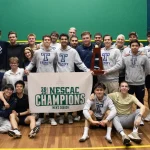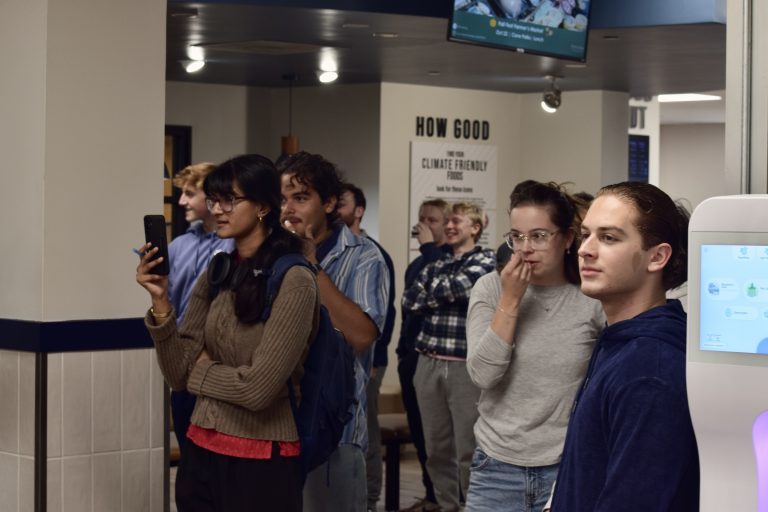Brendan W. Clark
Editor-in-Chief
The faculty heard from Vice President of Communications and Marketing Angela Schaeffer and Vice President for Information Technology Sue Aber on the continued COVID-19 responses at Trinity College.
Schaeffer indicated that the College would be issuing guidance “no later than 4:00 p.m. tomorrow, though hopefully earlier” regarding further action of the College relative to holding courses online or partially closing the campus. President of the College Joanne Berger-Sweeney indicated that any decision on closure would “probably be my decision, with a recommendation from the Board of Trustees.” Berger-Sweeney also indicated that she would be on a telephone call with the executive committee of the Board of Trustees later this afternoon regarding any actions the administration would take.
Schaeffer prefaced her remarks to the faculty by indicating that “mea culpa, she does not believe that the College has communicated with the campus enough” and that the Emergency Response Team is actively working to increase their communications. Schaeffer also indicated that her office is working to develop a “communications responder core” to better administer information going forward.
Schaeffer told the faculty that guidance about the length of a potential shutdown is being “actively considered, both with respect to short-term and long-term options.”
Schaeffer described the organizational structure of the College’s response in detail, describing four subcommittees that are responding to the COVID-19 crisis, in addition to the College’s long-standing Emergency Management Team. Those subcommittees include academics, students, campus, and business continuity.
The Emergency Management Team has been meeting regularly and is led by Director of Campus Safety Brian Heavren. The academics subcommittee is chaired by Faculty Secretary Mark Stater and Dean of Academic Affairs Anne Lambright. It oversees the College’s response with respect to curricular changes and matters of course instruction. The student subcommittee is chaired by Director of Analytics and Strategic Initiatives David Andres and Associate Dean of Students Ann Reuman and oversees student welfare and health. The campus subcommittee is chaired by Director of Campus Events Meg Fitzsimmons and Associate Dean of Students Robert Lukaskiewicz and oversees decisions to cancel campus events and monitor facilities operations. The business continuity subcommittee is chaired by Vice President for Finance and Operations Dan Hitchell and Assistant Vice President for Information Services Frederick Kass and “interfaces with all committees regarding best strategies going forward,” Schaeffer added.
Faculty expressed a variety of concerns. Associate Professor of English Prakash Younger inquired with Schaeffer and Aber regarding a “non-binding probability on the matter of if the College will be closed.” Schaeffer indicated that a “broad range of opinions have been circulated on how to respond” and added that Trinity’s response team has been on “weekly telephone calls with peer institutions” to best determine their responses.
Further, Associate Professor of Political Science Reo Matsuzaki asked how the College would place restrictions on parties following several which occurred on campus Monday and also sought guidance on how international students would be handled by the College. Schaeffer indicated that “while many institutions are moving to ‘remote learning,’ the College would not “really close, as at least 500 international students would likely need to remain on campus.”
Vice President for Student Affairs Joe DiChristina spoke to concerns about student parties and social functions, specifically addressing a series of parties on campus last night. DiChristina indicated that “partying cannot continue go on” and added that “as you can tell, I’m not pleased.” DiChristina continued, adding that he told students yesterday that they were “being rude” and that his office would be following up regarding regulating student activities going forward.
DiChristina also stated that, in the event of non-compliance, he might rely on provisions in the Student Handbook to enforce “disciplinary action” in an effort to regulate ongoing events. He concluded his remarks by indicating that “it is not often that I get irritated at students, but I was a little last night.”
Professor of Language and Culture Studies Katherine Lahti encouraged Trinity to “wait to shut down until a case of COVID-19 is confirmed at the College.” While no cases have been confirmed, Trinity presently has seven students in quarantine according to an email released by DiChristina Sunday, Mar. 8.
Assistant Professor of Psychology and Neuroscience Molly Helt asked if test kits were available at the Health Center. Director of Health Services Martha Burke O’Brien indicated that all tests are presently administered by the Connecticut Department of Public Health and that any tests would be conducted at Hartford Healthcare. She also added that, thus, “the current number of test kits at the Health Center is zero.”
With respect to ongoing interactions with students in-person, Associate Professor of History Jennifer Regan-Lefebvre asked about her ability to “meet with advisees and students individually.” Regan-Lefebvre also sought guidance on if there was a “moving wall for planning ahead for faculty research and conferences in the summer and fall.”
Schaeffer responded, noting that “current guidance is only through the end of March,” declining to indicate further restrictions as any discussion regarding cancellations of summer and fall activities and research is premature. Schaeffer also added that guidance regarding meeting students individually would “be addressed in tomorrow’s communication.”
Faculty also addressed questions of childcare and the Trinity College Community Child Center located on Trinity’s campus. Schaeffer indicated that those topics were actively under discussion and added that the team will be in communication with Trinity’s daycare provider.” It was noted that daycare services at Trinity are administered independently, however, Schaeffer emphasized that they are “a part of this community and will be kept informed.”
Questions regarding Trinity’s legislative internship program, administered through the Political Science department, were also asked. Specifically, faculty sought guidance on if the program could or would continue for credit if the campus were to close. Schaeffer indicated that this is a matter that would be under the purview of the academic subcommittee and will be addressed.
Professor of Art History Alden Gordon encouraged the committee to “ban spring break, keep students on campus, and teach a double course load seven days a week.” Schaeffer indicated that while the matter of cancelling spring break had been raised, she “had not heard” discussion on instituting a seven-day course schedule. Stater also responded, adding that those decisions would fall under the ambit of the academic subcommittee.
A concern was also raised that sought information on if the College was making this closure “in the interest of reputation or out of concerns of liability.” Schaeffer indicated that “reputation has never once been the rationale” in any responses the College has proffered and added that liability has been discussed from a “reverse perspective,” with questions about liability for collecting student travel information and the ramifications if an illness were to occur. Schaeffer indicated that “after consulting with legal counsel, the answer to that question is no” and reiterated her request that all register their travel with the College on the online registry.
Berger-Sweeney concluded the remarks on the College’s COVID-19 response, adding that she would like to “thank Angela Schaeffer and Sue Aber for their leadership on this” and stressed in response to a fellow faculty member’s comment on his view of COVID19 that she, too, “is among the individuals in the room with a master’s degree and Ph.D in Public Health” and that “she and her administration are in a good position and are doing the best they can to respond to this with the information they have been given.”
Feedback and concerns regarding the COVID-19 response can be addressed to the College’s dedicated email for the crisis, COVID-19-Feedback@trincoll.edu.









+ There are no comments
Add yours